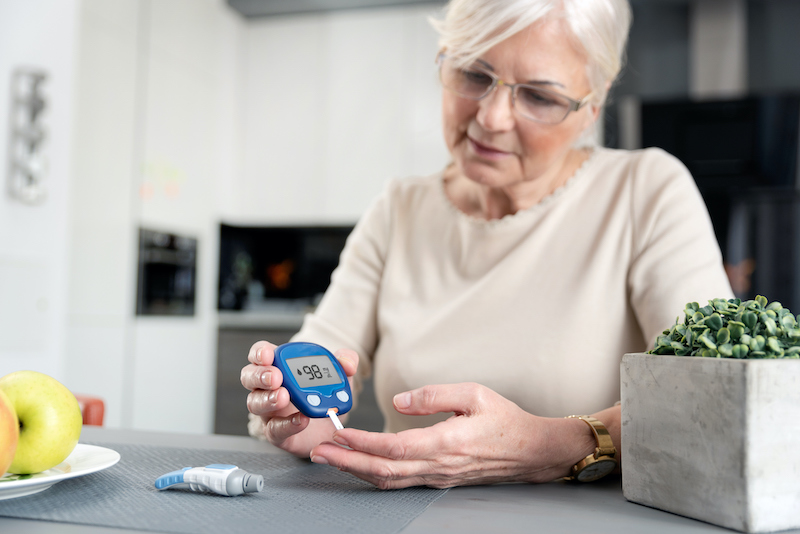
Seniors and diabetes: learn the symptoms and strategies to manage the disease.
Checking sugar levels. Injecting insulin. Carefully watching your diet. If this describes a normal day in your life, or that of an older adult you love, you know firsthand the obstacles that come with a diagnosis of diabetes. As November is Diabetes Awareness Month, the aging care team at Absolute Companion Care is pleased to share tips for best managing seniors and diabetes by providing the following important information every diabetic – and every family member who cares for one – needs to know.
What Does It Mean to Have Diabetes?
Simply speaking, our bodies transform a number of the foods we eat into glucose, which provides the energy we need – but only when our bodies make an ample amount of the hormone insulin to break down the glucose for our cells to be able to access it. Diabetics’ bodies are either not able to make enough insulin (type 1 diabetes), or aren’t able to make use of the insulin correctly (type 2 diabetes), resulting in an excessive amount of glucose in the blood.
Left untreated, diabetes could lead to severe health problems, including kidney, eye, and nerve issues, cardiovascular disease and stroke, and even a heightened risk for Alzheimer’s or cancer.
What Are the Symptoms of Diabetes?
Many people with type 2 diabetes have such mild symptoms, or symptoms that come and go, that they don’t even recognize there’s a problem until the disease progresses and symptoms worsen. Signs to watch for include:
- Tiredness
- Increased hunger and/or thirst
- Loss of weight
- Blurry vision
- Frequent urination
- Slower healing of cuts and bruises
- Skin infections
It is essential to talk to your physician if any of these symptoms become apparent.
Can Diabetes Be Managed?
Fortunately, once identified and effectively treated, and with adherence to lifestyle changes, diabetes can be managed and controlled. For some people, modifications to exercise and diet are sufficient, while other individuals need to have insulin injections and/or medication.
A doctor will put together a diabetes management plan to follow, which might include:
- How and when to track sugar levels
- Which foods to consume and which to avoid
- Exercises and physical activities
- A medication regimen
Tips to maximize health while managing diabetes include:
- Manage your blood pressure levels and cholesterol, and have them checked on a consistent basis.
- If you smoke, quit.
- Get annual pneumonia and flu vaccines, along with annual eye and kidney exams.
- Check the feet each day to look for blisters, calluses, red patches, sores, or other skin abnormalities, and visit a podiatrist with any concerns.
- Keep skin clean, protected, and moisturized.
- Ask your doctor for guidelines on cancer screenings, and for guidance on any other physical, emotional, or mental health concerns being experienced.
If you are in need of a caregiver in Phoenix, MD or the surrounding areas, Absolute Companion Care can provide help and information about seniors and diabetes management in a variety of ways, including transportation to medical appointments and procedures, meal planning and preparation in accordance with nutritional restrictions, medication reminders, and more. Email or call us at 410-357-9640 for a free in-home consultation for more information regarding our professional caregivers in Phoenix, MD and the surrounding areas.
